In his latest book, The Immortals of Australian Rugby Union, Gordon Bray (aka ‘The Voice of Rugby’ in Australia), celebrates the greatest players to wear the green & gold for the Wallabies. And as we gear up for upcoming encounters with the likes of the All Blacks, we look back at the short but brilliant career of the first indigenous Australian to captain a national sports team – the amazing fly-half Mark Ella…
A fly-half of sheer genius, Mark Ella had a brief but spectacular Test career featuring three famous wins over the All Blacks and a personal grand slam of Test tries on the all-conquering Wallaby tour of Britain and Ireland in 1984. Along with his brothers Glen and Gary, Mark revolutionised attacking rugby in Australia. The trio initially captured global attention on the unbeaten Australian Schools European tour in 1977-78 utilising their flat-line, close formation, ball-in-hand strategy. But Mark soon became the lead man as he displayed his scintillating handling and instinctive running lines. According to David Campese, ‘He is the best player I have known or seen.’
Mark Ella stunned the rugby world when he called time on his short but brilliant career at just 25 years of age. His premature loss to the code was a major blow given his performance level had just climbed to dazzling heights. From the outskirts of La Perouse to the great rugby cathedrals of Britain, Mark made an indelible impression. His soft hands, and often-mesmerising running lines helped transform the Wallaby backline into a lethal attacking force. By 1984 they were simply unstoppable. His love for the game was reflected in his schoolboy approach: keep the ball in hand, keep it alive and have fun in the process. In concert with brothers Glen and Gary, kicking was a last resort. Their aim was to create time and space and they did so in a revolutionary manner employing rapid ball movement from close formation in a flat alignment to feed a constant wave of support runners operating from different angles.
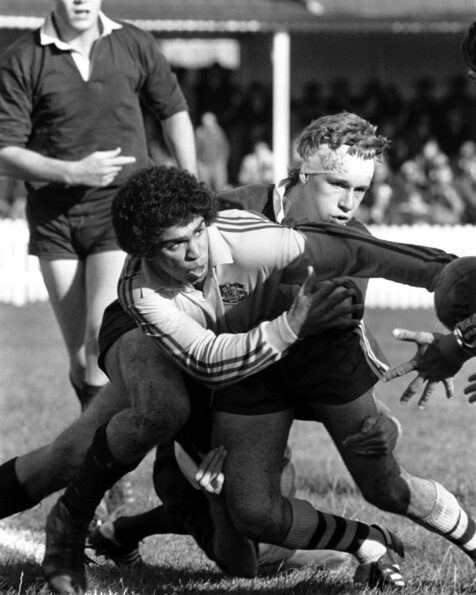
ball off as he is tackled in a Wallabies tour game in England in 1981
Mark’s mother May and father Gordon raised their 12 children in a shanty dwelling. Living conditions were primitive. There was no hot running water, and the toilet was an outhouse. As youngsters the three rugby brothers slept on a mattress in their parents’ bedroom. The remaining nine kids slept in the other two bedrooms. A daily activity for the boys was to collect wood for the fuel stove. Gordon was the breadwinner and worked at the nearby oil refinery. May was the quintessential matriarch and a strict disciplinarian. ‘Mum taught us to treat everybody as equals,’ Mark recalled in his biography ELLA coauthored with Bret Harris. ‘We grew up in a big Aboriginal community and she just wanted us to fit in with every nationality. She wanted us to do well, but to do well you had to do well at school. You had to respect people. You had to fit in.’
Despite the financial hardship, family life in the Ella household was rewarding. In summer the brothers were never short of leisure activities – swimming, diving for coins and fishing, playing golf on their makeshift three-hole course or collecting balls at the local golf club. Growing up, their friends included future Wallaby Lloyd Walker, future coaching guru Eddie Jones and Australian Schoolboys teammate Darryl Lester who lived next door.
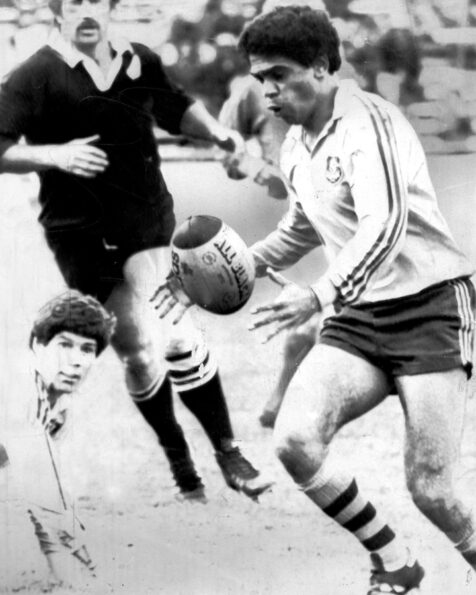
Mark and his brothers came to rugby prominence at Matraville High School under coach Geoff Mould who pinpointed Mark’s silky skills. ‘He had a latent ability to understand the requirements of fly-half. He underplayed his game to produce results. He ran straight and his soft pass allowed him to immediately support. I can honestly say I never saw Mark drop a ball.’ One of the school’s more noteworthy wins was against the wealthy Greater Public Schools powerhouse St Joseph’s College in a pre-season trial at Latham Park, South Coogee. ‘We turned up looking like a bunch of liquorice all sorts,’ Mark recalled. ‘They turned up with two busloads of supporters (in school uniform). These guys are in all their regalia. Boots are perfect. We had Souths socks, Matto socks, holes in our jerseys, fuzzy hair. It was a weird feeling.’ Two interested spectators that day were future Wallaby coach Bob Dwyer and Wallaby legend Cyril Towers. Both men were destined to have a huge influence on Mark’s career, Bob as his club and national coach and Cyril as a personal mentor. Matraville remained unbeaten in 24 games in 1977, the Ellas’ final year, scoring an incredible 228 tries, 122 of those by the wingers.
Later that year Mould became head coach of the unbeaten national schoolboy team. That trailblazing squad rewrote the coaching manuals drawing large crowds on their celebrated 16-match sweep through the UK, Ireland, Holland and Japan. They scored 566 points for, to only 97 against. Although 10 members of that team went on to achieve Wallaby status (and Wally Lewis became a rugby league immortal), Mark and his two brothers were the stars of the show. After the tour the three Ellas bypassed colts and were rushed straight into senior grade rugby at Randwick. Youngest brother Gary was first to debut in the top grade but when the trio was finally selected together, mayhem was the operative word for opposition defences. A 63-0 demolition of previously unbeaten Northern Suburbs emphatically confirmed the arrival of a new and exciting rugby phenomenon.
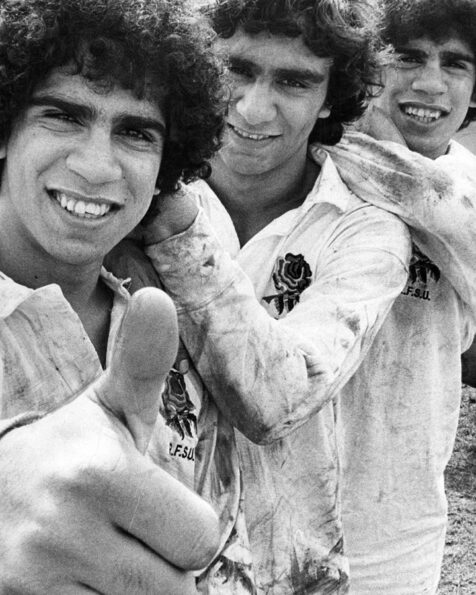
and sense of fun
In 1979 Mark and his identical twin Glen were selected in the Australian team for the Hong Kong Sevens. It was Mark’s first taste of senior representative rugby and the new-look Aussie team wowed the fans with exhilarating running and passing, downing Samoa 39-3 in the final. Mark enjoyed a further taste of international football on his return. After missing selection for the first interstate clash (Queensland won 48-10) Mark was chosen at fly-half in the Sydney team to meet Ireland. He seized the chance to oppose the mercurial Tony Ward. The result was Ireland’s only loss on their tour Down Under. Mark’s surprise ‘in-your-face’ attacking style helped prise open the rattled defence for two well-conceived tries. Selection in the Wallaby squad to tour Argentina followed but there was no Test spot for the 20-year-old with Paul McLean and Tony Melrose ahead in the pecking order.
Ella’s big moment finally arrived the following year despite initially being overlooked at fly-half in favour of Michael Hawker in the one-off Test in Suva against Fiji. (Melrose had gone to rugby league.) An eye-catching performance for Sydney in their 13-13 draw against the All Blacks convinced national coach Bob Templeton that Mark was ready, especially as McLean was unavailable with a knee injury. When Mark told his mother May he’d been selected at fly-half to face New Zealand at the SCG, she fainted. Andrew Slack had been chosen at inside-centre but when he succumbed to a shoulder injury, former schoolboy stars Hawker and Michael O’Connor were united in the centres. Templeton changed tack and told the three youngsters to work out how they wanted to play.
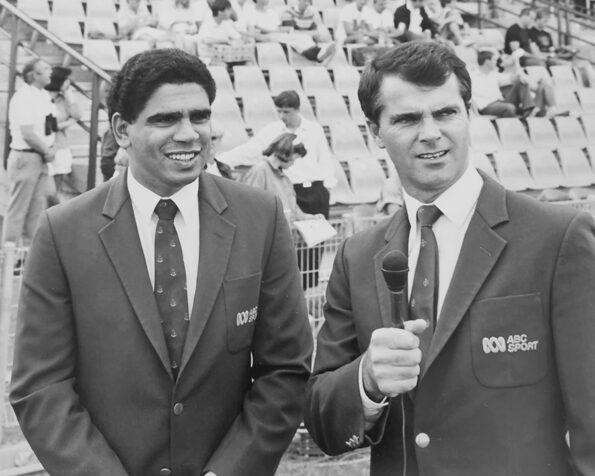
‘To his credit he (Templeton) gave us our freedom,’ Mark reflected in ELLA. ‘We said there is only one way we know how to play. Let’s have a go and run them around. And that’s what we did.’ Mark’s confidence level skyrocketed before the game. ‘That was the best combination I played in with the Wallabies. Apart from being very talented individually, it was the way we combined. We complemented each other. I was a good distributor and support player, Hawker was solid and ran hard and straight and O’Connor was a freak who could do anything.’ Feeding off a solid forward platform led by Tony Shaw and including impressive rookies Simon Poidevin and Steve Williams, the Aussie backs ran riot. Mark was the spearhead, and the Wallabies clinched the series and the Bledisloe Cup with a breathtaking 26-10 win in the Third Test at the SCG. It was Australia’s first three Test series win against New Zealand on home soil since 1934 and the largest-ever winning margin against the All Blacks.
The three Ella brothers were then chosen for the 1981–82 tour of Britain and Ireland. Beforehand, team manager Sir Nicholas Shehadie organised a fundraiser at the City Tattersalls Club so that May and Gordon could join the Test match portion of the tour. The return of the now famous brothers was headlined in the English media and the Wallabies were hailed as world-beaters. Alas, the Wallabies never matched the hype. The trio failed to establish full fluency when selected together. Mark was personally below his best as he tried to improve his kicking game and adapt to a more conservative team pattern which required him to stand deeper.
Not selected, Ella watched from the grandstand as Australia downed Ireland 16-12 but then fell away when in winning positions against Wales, Scotland and England. In Cardiff he stagnated on the reserves bench as the Wallabies butchered their chance of a Grand Slam with the loss to Wales. He was finally recalled for the Scottish Test with Paul McLean shifting to inside centre. Australia scored three tries to one but kicked only one goal from seven attempts. In the Test match at Twickenham, goal kicking was again the team’s Achilles heel. England was outscored by two tries to one, but the Wallabies only managed one goal from five attempts. Mark revealed his frustrations. ‘The other teams [Wales, Scotland and England] were inferior to Ireland, and we lost to all of those teams. That sums up the tour. We wasted the other three Test matches.’ Thankfully, Mark and many of the same teammates would return to Britain two years later to comprehensively rewrite history.
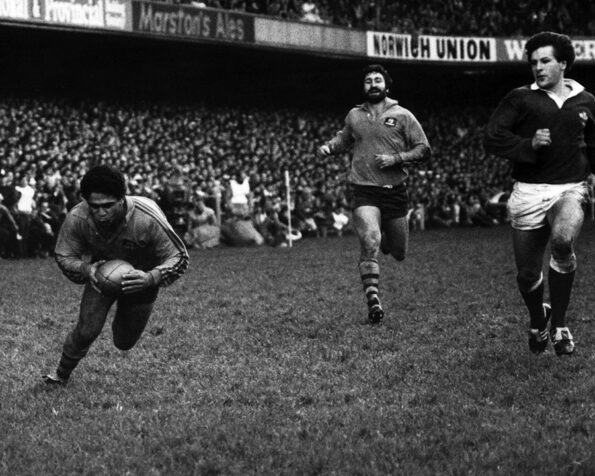
grand slam tour of Britain and Ireland in 1984
Randwick coach Bob Dwyer had made Mark first grade captain in 1980 and it proved a springboard for three straight premiership victories. On the back of that momentum Dwyer was appointed national coach in 1982, replacing Templeton. He immediately went ‘all-in’. Dwyer controversially chose Mark and Glen over Queensland heroes Paul McLean and Roger Gould for the First Test against Scotland at Ballymore. A barrage of criticism ensued in the local media and by game day Mark and Glen were walking on eggshells, rattled by the torrent of negative attention. When sections of the crowd booed as the Wallabies took the field, Australian rugby hit its lowest ebb.
In his biography, Mark summed up his despair. ‘It was terrible. They booed the Wallabies. I felt like crap. The boos were directed at Glen and me. Disgraceful.’ The brothers both had forgettable games as the Aussies bombed at least four tries allowing Scotland to score an upset 12-7 victory. McLean and Gould were reinstated for the Second Test at the SCG and both had superb games in the record 33-9 triumph. Paul kicked eight goals from nine attempts and Roger scored two tries from fullback – then a record against any ‘tier one’ country. But emerging from the aftermath of the Ballymore disaster came Mark’s greatest honour.
When nine Queenslanders, including the three most recent Test captains (Mark Loane, Tony Shaw and McLean) withdrew from the Wallaby tour of New Zealand, Dwyer offered Mark the captaincy. After initially rejecting the idea, Ella saw his coach’s reasoning. ‘Bob needed support. He was under siege. He needed somebody he could rely on. Whether I was the best person for captain is debatable, but Bob needed friends and I was one of his biggest supporters. I guess that’s why I got the nod.’ Twelve new Wallabies were named in the touring squad including an exciting teenager, David Campese.
The three Ella brothers never played a Test together but came closest in the First Test against the Kiwis in Christchurch. Roger Gould passed a last minute fitness test which denied Glen the opportunity to join Mark and Gary in the starting team. The All Blacks won the series 2-1 but only after overcoming a half-time deficit in the Auckland decider. Australia’s highlight was the stunning Second Test victory in Wellington. Crucially, Mark won the toss in that game and ran with the first half gale to build a 19-3 lead at the break thanks to two spectacular tries. The second half saw one of the great Wallaby defensive efforts with back-rowers Poidevin, Peter Lucas and Chris Roche ferociously chopping down every All Black who came their way. Soon after, Mark’s leadership and ability were duly recognised when he was named Young Australian of the Year.
After a lacklustre tour of France in 1983 Dwyer was out as Wallaby coach and premiership winning Manly coach Alan Jones was in. Ella lost the captaincy to Andrew Slack and, unbeknown to most, his departure from international rugby later that season had already been decided. Four years earlier, Mark had told his girlfriend Kim that he would retire when he turned 25 and marry her. Being stripped of the captaincy only reinforced his conviction there was no turning back. Wife Kim believes the setback was a blessing. ‘It took the pressure off him. Andrew [Slack] let him run his own race over there. The Grand Slam was a gift. It wasn’t something he aspired to. It just came to him.’
It sure did! Mark’s spectacular ‘loop’ try against England at Twickenham set up a record 19-3 victory. The run-around move was considered obstruction in Britain, but Mark called the ploy just once on the whole tour, realising a New Zealand referee was in charge that day. Against Ireland Australia was in trouble trailing 9-3 midway through the second half. But two Ella drop goals with either foot steadied the ship before he engineered and scored the winning try after handling twice in the movement. The Wales Test was all about the mighty Wallaby forward pack but. Mark had the final say with a clever intercept try after anticipating that their opponent’s pass would come his way. The Scots met a similar fate at the hands of the Wallabies, but Mark can thank roommate Roger Gould for the try that completed his personal grand slam. Again he handled twice as Roger turned the ball back inside when the defence thought it was going out to Campese. Ella remembers his elation: ‘I always say for a guy who was slow and couldn’t sidestep, to score four tries in four Tests was pretty special. I had played in 21 Test matches and scored two tries. Now I’d scored four in a row. I knew I was going to retire.’ Ousted coach Dwyer was gushing in his praise. ‘Jones’ decision to let Mark call the shots was a masterstroke. He played fantastically well. Mark was just a genius. He carried that tour.’
Mark was the first Indigenous Australian to captain Australia in any sport. Inducted into the International Rugby Hall of Fame in 1997, he now lives on the NSW Central Coast with wife Kim. They have two children, a son Simon and daughter Nicole who is a lawyer. His journey after the Wallabies has been varied and fascinating. From TV commentator with ABC Sport to weekly columnist with The Australian newspaper, to marketer, businessman and successful rugby coach in Italy, Mark Ella has always kept active. Outside rugby, one of his greatest regrets is that he didn’t get to see his sister Marcia play in more than one of her 18 international appearances for the Australian Diamonds Netball team.
During his playing career Ella received many lucrative offers to switch to rugby league but always resisted. In 1985 the St George Dragons offered him ‘telephone numbers’. They needed a five eighth and Michael O’Connor was desperate to reunite with his good mate. Mark rang ‘The King’ – Wally Lewis – in Brisbane for a second opinion (Lewis still rates Mark the best footballer he played with in either code). When told the amount on offer, Wally replied, ‘Shit, that’s more than I’m getting!’ Say no more.
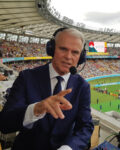
ABOUT THE AUTHOR
Gordon Bray is renowned throughout Australia for more than four decades as the ‘Voice of Rugby’. He is one of our longest serving sports commentators having spent 25 years with ABC Sport, 16 years at the Seven Network and 10 years at Ten. He has called over 25 sports at international level and covered 10 Olympic Games. Amongst many accolades, he was made a Member of the Order of Australia in 2005.
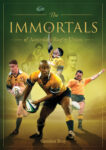
This is an edited extract from THE IMMORTALS OF AUSTRALIAN RUGBY UNION by Gordon Bray (Gelding Street Press, $39.99rrp) available at all good bookstores
By GORDON BRAY
For the full article grab the August 2024 issue of MAXIM Australia from newsagents and convenience locations. Subscribe here.




